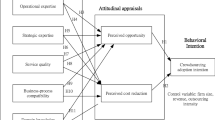Abstract
Contest-based intermediary crowdsourcing represents a powerful new business model for generating ideas or solutions by engaging the crowd through an online competition. Prior research has examined motivating factors such as increased monetary reward or demotivating factors such as project requirement ambiguity. However, problematic issues related to crowd contest fitness have received little attention, particularly with regard to crowd strategic decision-making and contest outcomes that are critical for success of crowdsourcing platforms as well as implementation of crowdsourcing models in organizations. Using Expectation-Confirmation Theory (ECT), we take a different approach that focuses on contest level outcomes by developing a model to explain contest duration and performance. We postulate these contest outcomes are a function of managing crowdsourcing participant contest-fitness expectations and disconfirmation, particularly during the bidding process. Our empirical results show that contest fitness expectations and disconfirmation have an overall positive effect on contest performance. This study contributes to theory by demonstrating the adaptability of ECT literature to the online crowdsourcing domain at the level of the project contest. For practice, important insights regarding strategic decision making and understanding how crowd contest-fitness are observed for enhancing outcomes related to platform viability and successful organizational implementation.


Similar content being viewed by others
References
Anderson, E. W., & Sullivan, M. W. (1993). The antecedents and consequences of customer satisfaction for firms. Marketing Science, 12(2), 125–143.
Bayus, B. L. (2013). Crowdsourcing new product ideas over time: An analysis of the Dell IdeaStorm community. Management Science, 59(1), 226–244.
Bhattacherjee, A. (2001). Understanding information systems continuance: An expectation-confirmation model. MIS Quarterly, 25(3), 351.
Bhattacherjee, A., & Premkumar, G. (2004a). Understanding changes in belief and attitude toward information technology usage: A theoretical model and longitudinal test. MIS Quarterly, 28(2), 229–254.
Bhattacherjee, A., & Premkumar, G. (2004b). Understanding changes in belief and attitude toward information technology usage: A theoretical model and longitudinal test. MIS Quarterly, 28(2), 229–254.
Bolton, G., Loebbecke, C., & Ockenfels, A. (2008). Does competition promote trust and trustworthiness in online trading? An experimental study. Journal of Management Information Systems, 25(2), 145–170.
Boudreau, K. J., Lacetera, N., & Lakhani, K. R. (2011). Incentives and problem uncertainty in innovation contests: An empirical analysis. Management Science, 57(5), 843–863.
Boudreau, K. J., & Lakhani, K. R. (2013). Using the crowd as an innovation partner. Harvard business review, 91(4), 60–69.
Brown, S. A., Venkatesh, V., & Goyal, S. (2012). Expectation confirmation in technology use. Information Systems Research, 23(2), 474–487.
Bullinger, A. C., Neyer, A.-K., Rass, M., & Moeslein, K. M. (2010). Community-based innovation contests: Where competition meets cooperation: Community-based InnovationContests. Creativity and Innovation Management, 19(3), 290–303.
Chanal, V., & Caron-Fasan, M.-L. (2010). The difficulties involved in developing business models open to innovation communities: The case of a crowdsourcing platform. M@n@gement, 13(4), 318–340.
Chawla, S., Hartline, J. D., & Sivan, B. (2015). Optimal crowdsourcing contests. Games and Economic Behavior., 13, 80–96.
Cheung, C. M. K., & Lee, M. K. O. (2009). Understanding the sustainability of a virtual community: Model development and empirical test. Journal of Information Science, 35(3), 279–298.
Chiu, C.-M., Liang, T.-P., & Turban, E. (2014). What can crowdsourcing do for decision support? Decision Support Systems, 65, 40–49.
Djelassi, S., & Decoopman, I. (2013). Customers’ participation in product development through crowdsourcing: Issues and implications. Industrial Marketing Management, 42(5), 683–692.
Duan, W., Gu, B., & Whinston, A. B. (2008). Do online reviews matter? — An empirical investigation of panel data. Decision Support Systems, 45(4), 1007–1016.
Geiger, D., & Schader, M. (2014). Personalized task recommendation in crowdsourcing information systems — Current state of the art. Decision Support Systems, 65, 3–16.
Giles, M. (2018). Crowdsourcing the hunt for software bugs is a booming business—And a risky one. MIT Technology Review. Retrieved from https://www.technologyreview.com/s/611892/crowdsourcing-the-hunt-for-software-bugs-is-a-booming-businessand-a-risky-one/.Accessed 10 Sept 2018
Gräuler, M., Freundlieb, M., Ortwerth, K., & Teuteberg, F. (2013). Understanding the beliefs, actions and outcomes of sustainability reporting: An experimental approach. Information Systems Frontiers, 15(5), 779–797.
Hair, J. F., Jr., Anderson, R. E., Tatham, R. L., & William, C. (1995). Multivariate data analysis with readings. New Jersey: Prentice Hall.
Haruvy, E., & Leszczyc, P. T. L. P. (2010). The impact of online auction duration. Decision Analysis, 7(1), 99–106.
Hastie, R., & Dawes, R. M. (2010). Rational choice in an uncertain world: The psychology of judgment and decision-making. Sage.
Hayes, A. F. (2012). My macros and code for SPSS and SAS. Retrieved from URL: http://afhayes.com/spss-sas-andmplus-macros-and-code.html. Accessed 10 Sept 2018
Hayes, A. F. (2013). Introduction to mediation, moderation, and conditional process analysis. New York: Guilford Press.
Hayes, A. F., & Scharkow, M. (2013). The relative trustworthiness of inferential tests of the indirect effect in statistical mediation analysis: Does method really matter? Psychological Science, 24(10), 1918–1927.
Javadi Khasraghi, H., & Aghaie, A. (2014). Crowdsourcing contests: Understanding the effect of competitors’ participation history on their performance. Behaviour & Information Technology, 33(12), 1383–1395.
Kajino, H., Arai, H., & Kashima, H. (2014). Preserving worker privacy in crowdsourcing. Data Mining and Knowledge Discovery, 28(5–6), 1314–1335.
Kauffman, R. J., & Wood, C. A. (2006). Doing their bidding: An empirical examination of factors that affect a buyer’s utility in internet auctions. Information Technology and Management, 7(3), 171–190.
Kennedy, P. (1998). A guide to econometrics (4th ed.). Cambridge: MIT Press.
Kidwell, R. E. (2010). Loafing in the 21st century: Enhanced opportunities—And remedies—For withholding job effort in the new workplace. Business Horizons, 53(6), 543–552.
Kim, D. J., Ferrin, D. L., & Rao, H. R. (2008). A trust-based consumer decision-making model in electronic commerce: The role of trust, perceived risk, and their antecedents. Decision Support Systems, 44(2), 544–564.
Kimbarovsky, R., & Samson, M. (2008). crowdSPRING, LLC. Retrieved from www.crowdspring.com.
Klein, S., & Teubner, R. A. (2000). Web-based procurement new roles for intermediaries. Information Systems Frontiers, 2(1), 19–30.
Kuo, M.-J. (2007). How does an online game based learning environment promote students’ intrinsic motivation for learning natural science and how does it affect their learning outcomes? Digital Game and Intelligent Toy Enhanced Learning, 2007. DIGI℡‘07. The First IEEE International Workshop On, 135–142.
Lankton, N. K., McKnight, D. H., Wright, R. T., & Thatcher, J. B. (2016). Research note—Using expectation disconfirmation theory and polynomial modeling to understand Trust in Technology. Information Systems Research, 27(1), 197–213.
Leimeister, J. M., Huber, M., Bretschneider, U., & Krcmar, H. (2009). Leveraging crowdsourcing: Activation-supporting components for IT-based ideas competition. Journal of Management Information Systems, 26(1), 197–224.
Lin, T.-C., & Huang, C.-C. (2010). Withholding effort in knowledge contribution: The role of social exchange and social cognitive on project teams. Information & Management, 47(3), 188–196.
Liu, T. X., Yang, J., Adamic, L. A., & Chen, Y. (2014). Crowdsourcing with all-pay auctions: A field experiment on taskcn. Management Science, 60(8), 2020–2037.
McKinney, V., Yoon, K., & Zahedi, F. “Mariam.” (2002). The measurement of web-customer satisfaction: An expectation and disconfirmation approach. Information Systems Research, 13(3), 296–315.
Mithas, S., & Jones, J. L. (2009). Do auction parameters affect buyer surplus in E-auctions for procurement? Production and Operations Management, 16(4), 455–470.
Oliver, R. L. (1977). Effect of expectation and disconfirmation on Postexposure product evaluations: An alternative interpretation. Journal of Applied Psychology, 62(4), 480–486.
Oliver, R. L. (1980). A cognitive model of the antecedents and consequences of satisfaction decisions. Journal of Marketing Research, 17(4), 460–469.
Pe-Than, E. P. P., Goh, D. H.-L., & Lee, C. S. (2017). Does it matter how you play? The effects of collaboration and competition among players of human computation games. Journal of the Association for Information Science and Technology, 68(8), 1823–1835.
Robert, L. P., & Romero, D. M. (2017). The influence of diversity and experience on the effects of crowd size. Journal of the Association for Information Science and Technology, 68(2), 321–332.
Satzger, B., Psaier, H., Schall, D., & Dustdar, S. (2013). Auction-based crowdsourcing supporting skill management. Information Systems, 38(4), 547–560. https://doi.org/10.1016/j.is.2012.09.003.
Schenk, E., & Claude, G. (2011). Towards a characterization of crowdsourcing practices. Journal of Innovation Economics & Management, 1, 93–107.
Schonfeld, E. (2008, May 12). When Crowdsourcing Fails: Cambrian House Headed to the Deadpool. CrunchBase. Retrieved from https://techcrunch.com/2008/05/12/when-crowdsourcing-fails-cambrian-house-headed-to-the-deadpool/. Accessed 11 July 2017
Simon, H. A. (1978). Rationality as process and as product of thought. The American Economic Review, 1–16.
Tandoc, E. C., Ferrucci, P., & Duffy, M. (2015). Facebook use, envy, and depression among college students: Is facebooking depressing? Computers in Human Behavior, 43, 139–146.
Taylor, P. (2017). March. In Crowdsourcing service providers Retrieved from http://clients1.ibisworld.com/reports/us/industry/ataglance.aspx?entid=5672. Accessed 17 July 2018
Venkatesh, & Goyal. (2010). Expectation disconfirmation and technology adoption: Polynomial modeling and response surface analysis. MIS Quarterly, 34(2), 281.
Venkatesh, V., Thong, J. Y. L., Chan, F. K. Y., Hu, P. J.-H., & Brown, S. A. (2011). Extending the two-stage information systems continuance model: Incorporating UTAUT predictors and the role of context: Context, expectations and IS continuance. Information Systems Journal, 21(6), 527–555.
Xiao, L. (2014). Effects of rationale awareness in online ideation crowdsourcing tasks: Journal of the American Society for Information Science and Technology. Journal of the Association for Information Science and Technology, 65(8), 1707–1720.
Yu, J., Zo, H., Kee Choi, M., & P. Ciganek, A. (2013). User acceptance of location-based social networking services: An extended perspective of perceived value. Online Information Review, 37(5), 711–730. https://doi.org/10.1108/OIR-12-2011-0202
Zheng, H. (2014). Antecedents Of Solution Quality In Crowdsourcing: The Sponsor’s Perspective. 15(3), 14.
Zheng, H., Li, D., & Hou, W. (2011). Task design, motivation, and participation in crowdsourcing contests. International Journal of Electronic Commerce, 15(4), 57–88. https://doi.org/10.2753/JEC1086-4415150402.
Author information
Authors and Affiliations
Corresponding author
Additional information
Publisher’s Note
Springer Nature remains neutral with regard to jurisdictional claims in published maps and institutional affiliations.
Rights and permissions
About this article
Cite this article
Ayaburi, E.W., Lee, J. & Maasberg, M. Understanding Crowdsourcing Contest Fitness Strategic Decision Factors and Performance: An Expectation-Confirmation Theory Perspective. Inf Syst Front 22, 1227–1240 (2020). https://doi.org/10.1007/s10796-019-09926-w
Published:
Issue Date:
DOI: https://doi.org/10.1007/s10796-019-09926-w




